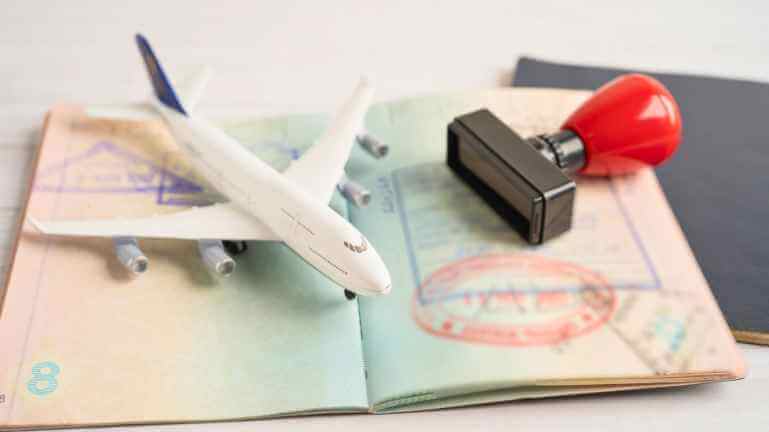Embarking on international travel is an adventure that opens doors to diverse cultures, breathtaking landscapes, and unforgettable experiences.
However, the key to a seamless and enjoyable journey lies in meticulous preparation. Proper planning ensures a smooth trip and safeguards against unforeseen complications.
Proper groundwork before departure significantly influences the quality of your travel experience.
This guide on things to do before traveling internationally aims to equip you with essential tips and strategies for preparing effectively for your international adventure.
Taking Essential Preparations
Passport and Visa Requirements
Before any international trip, ensure your passport has at least six months of validity beyond your planned return date.

Research visa requirements for your destination well in advance, as processing times vary.
Some countries offer visas on arrival, while others require an application process that can take weeks or even months.
Health Precautions
Consult a travel health clinic or your doctor about necessary vaccinations for your destination. Also, ensure you have an adequate supply of any prescription medications, carried in their original containers, along with a doctor’s note explaining their use.
Travel Warnings and Advisories
Check your government’s travel advisories for your destination.
These warnings provide crucial information about safety, health risks, and political situations that could affect your travel. Updated information will help you to make educated decisions and take necessary precautions to ensure your safety abroad.
Financial Preparations
Notify your bank of your travel dates and destinations to prevent any issues with your credit or debit cards abroad.
Familiarize yourself with the local currency and exchange rates. You can carry some local currency for immediate expenses and understand the foreign transaction fees associated with your cards.
Travel Insurance
Never underestimate the importance of travel insurance for international trips.
It covers unexpected medical emergencies, trip cancellations, lost luggage, and other unforeseen events.
Choose a policy that fits your travel needs, considering factors like destination, duration, and activities planned. Always carry proof of your insurance with you.
Emergency Preparations
Compile a list of emergency contacts, including local emergency services, the nearest embassy or consulate, and family back home.
Study the basic emergency procedures and local laws of the country you’re visiting. Keep a digital and physical copy of important documents like your passport, insurance policy, and emergency contacts.
Take Practical Arrangements
Accommodation and Transportation
Secure your accommodation in advance, especially for the first few nights. Research options that align with your budget and comfort preferences. Understand the local transportation system of your destination, including public transport options, taxi services, and any apps that might be useful for navigating or booking rides.
Cultural Research
Immerse yourself in the cultural norms and laws of your destination before arrival. This includes understanding dress codes, local customs, and social etiquette. These aspects not only show respect for the local culture but also help in avoiding unintentional offenses and enhance your travel experience.
Communication Plans
Ensure your mobile phone is set up for international use.
This might involve activating a global roaming plan or purchasing a local SIM card upon arrival.
Research the best communication options, including cost-effective international calling plans or apps like WhatsApp and Skype for staying connected.
Packing Essentials
Pack smartly for your international trip. Essentials include appropriate clothing for the climate and culture, travel-sized toiletries, adapters for electronics, and any necessary health items.
Don’t forget to pack light to ease mobility, but ensure you have all the essentials for the specific conditions of your destination.
Document Copies and Itinerary
Create copies of important documents like your passport, visa, travel insurance, and any medical prescriptions. Keep a set with you separate from the originals and leave another with a trusted person back home. Share your travel itinerary with family or friends for safety and emergency purposes.
Language Preparation
Learn key phrases in the local language of your destination. Basic greetings, directions, and common questions can greatly enhance your travel experience and interactions with locals. You can use language apps, phrasebooks, or online resources to familiarize yourself with essential phrases.
Last-Minute Checklist
Final Health Check
Before departure, schedule a final health check-up. Confirm you have all necessary vaccinations and enough prescription medications for the duration of your trip. Also, assemble a basic travel health kit with items like pain relievers, band-aids, and any personal health essentials to handle minor ailments on the go.
Luggage and Packing Review
Re-examine your luggage a day before travel. Ensure you’ve packed all essentials, adhering to airline baggage restrictions. Check weather forecasts again to confirm you’ve packed suitable clothing. Organize your luggage efficiently, keeping important items like travel documents and medications in easily accessible places.
Home Preparations
Secure your home by ensuring all doors and windows are locked. Arrange for mail collection or hold mail service to avoid an overflowing mailbox. Unplug unnecessary electronics to save energy and reduce fire hazards. If possible, inform a trusted neighbor or friend about your absence for additional security.
Financial Finalization
Complete any last-minute financial tasks. Ensure you have a mix of payment methods, including cash in the local currency of your destination. Double-check your travel budget, accounting for emergencies. Review and understand the fees associated with using your credit or debit cards internationally to avoid surprises.
Technology Setup
Charge all electronic devices and pack necessary chargers and adapters. Update or install useful travel apps on your smartphone. If you plan to use digital boarding passes or tickets, ensure they are downloaded and accessible offline. Back up important data from your devices in case of loss or theft.
Mental Preparation
Prepare mentally for your journey. Acknowledge any anxieties and address them with practical solutions. Familiarize yourself with your first day’s itinerary to ease stress upon arrival. Embrace the excitement and adventure that awaits, and maintain a flexible, positive mindset to adapt to new experiences and cultures.
Frequently Asked Questions
What are the most important things to do before traveling internationally?
Ensure your passport is valid, obtain necessary visas, get recommended vaccinations, inform your bank of your travel plans, and purchase travel insurance. Additionally, make copies of important documents and understand the local laws and customs of your destination.
How early should I start preparing for international travel?
Start preparing at least 3-6 months in advance, especially for tasks like passport renewal, visa applications, and getting vaccinations.
Do I need special insurance for international travel?
Yes, it’s advisable to get travel insurance that covers medical emergencies, trip cancellations, lost luggage, and other unforeseen events.
Should I carry cash or rely on cards during international travel?
Carry a mix of both. Inform your bank to avoid card issues, understand foreign transaction fees, and have some local currency for places that don’t accept cards.
What are the essential items to pack for international travel?
Pack travel documents, appropriate clothing, a basic first-aid kit, chargers and adapters, essential toiletries, and any personal items necessary for your comfort and convenience.
Conclusion
International travel is always a source of thrilling and enjoyable experiences. However, the key to a fulfilling journey lies in thorough preparation. From managing travel documents to understanding cultural nuances, each step of preparation makes a journey more enjoyable and adventurous.

